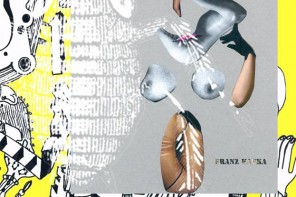Since the dawn of recorded history, humanity has constantly been migrating. From their migration across the frozen Bering Strait, to the current mass movements of refugees across the globe, humans have always been on the move. While it is an intrinsic part of our history, human movement is often the centerpiece of political discourse: from the raging battles in the United States over immigration reform and the student “dreamers”, to the more recent case of the Roma child deported from France. Politicians have never strayed too far from using the migrant narrative and, in most instances, they have used to justify militarized security, tougher borders, and more restrictions on movement. Though the immigrant narrative is highly visible in the media, academic research domains and the mouths of politicians worldwide, the voices of migrants are almost always silent and reduced to their political context.
This ‘invisible’ narrative can be visualized through the lens of the 2009 drama, Entre Nos, directed by Gloria La Morte and Paola Mendoza. Entre Nos tells the story of Mariana, a recent migrant from Colombia living in New York City with her two children, Gabi and Andrea, and the consequences of her husband Antonio leaving them to pursue a life in Miami. The drama explores themes of poverty, morality, and the cruel realities of living in New York City as an immigrant, but it also serves as a platform to explore the invisibility that immigrants experience – not only in New York but throughout the world – because of their socially-contracted status.
Early on in the film, Antonio abruptly leaves to Miami for work and promises Mariana that he will send for them in due time. Though arguably a stereotypical archetype for Latino men (and for men of color throughout cinema) the departure of the father sets the stage for a larger narrative of movement through time and space. Mariana, in anger, recounts to her friend Alejo how they have moved from Bogota to Medellin, and now to New York. This sentiment is shared by her son Gabi who, when playing with a girl from the neighborhood, tells her about the places he’s been. Gabi does not stand alone: his newfound friend recounts her own migration story, including her time in Texas and California. Throughout the film, Mariana and Gabi must contend with this reality. They move from apartment to apartment, sleeping in parks and abandoned lots, and experience the exhaustive elusiveness of trying to find somewhere that they can call ‘home’.
However, the deeper motifs of the film transcend the migrant New York City experience and explore the philosophical questions of movement through time and space. Not only is the family coming to grips with their traumatic situation – having to collect cans for money, sell empanadas, and do odd jobs here and there – but their personal existence is dependent upon a continuum of movement that intertwines both their history and their outlook of the future. Mariana, aside from having to protect her children, is constantly reflecting on her past and how it led to them being homeless, with virtually no possessions, money, or hope. Gabi, a boy who is becoming a man faster than any child should, grapples with his forced metaphysical maturation from childhood to adulthood, in having to help his mother while still wanting to play and have fun despite the dire situation his family is in. And Andrea, who is perhaps the most vulnerable as a much-younger child, is unknowing of the perils they face. This is beautifully expressed when she innocently points out to Gabi that they slept in a park, not thinking anything of it beyond her objective observations.
The drama offers brilliant insight into the larger macro-complexities of human migration. Just as Mariana, Gabi, and Andrea are moving together, their experiences are completely unique. Not only that, but each must decide how to reconcile their past with their present, and what that means for their futures. In one scene, Gabi goes to his friend to say goodbye forever. At such a young age Gabi – perhaps inspired to be a better person than his father – understands the significance of leaving the past, and how deadly it can be if one does not give it closure. Mariana has a similar experience but her past is harder to let go of, as she must deal with the choice of aborting a baby fathered by Antonio. When asked later on if the baby has a father, she says that there is none, demonstrating her choice to abandon all that tied her down to her past and giving that question far more significance than the moral implications of her choice.
With the backdrop of New York City subways in constant motion, and the nostalgic sounds of guitars and Colombian cumbia, the aesthetic design of Entre Nos allows the audience to immerse themselves in the human side of the characters’ story rather than delve into a politicized call for action. Through shots of train rides, patriarchal encounters with men, and a trip to the movies, Entre Nos does not hesitate to show the familiarity of the everyday as a rare novelty. Moments invoking an emotional response are creatively mixed with moments of introspection and relative relief from the unfortunate circumstances that Mariana and her children must face everyday. The narrative of movement is not reduced to simple political discourse, but broadened to a human experience – although that experience is invisible to the masses of New York. This invisibility is a result of the fact that, in order to survive, one must continue to migrate – be it from one country to another, apartment to apartment, or from job to job. Furthermore, these stories are often ignored because of their apparent brevity and insignificance. Marianna is not seen by the inhabitants of New York, save for a few that help her along the way, and those that do help do so not because of her status as an immigrant, but because of their human interaction. A woman who works on a food truck gives them breakfast, while another gives them shelter after learning Mariana is pregnant. The status of being an immigrant alone does not suffice to be noticed; rather, it is Mariana’s humanity that makes people see her. While the experiences of Mariana and her family are human experiences, their invisibility is reinforced by their politicized identity.
A paradox arises. Though migrants have been center stage in many political battles, their usefulness is exhausted in a way that makes them simultaneously invisible. The film highlights Mariana’s humanity without ever mentioning her legal status – how she came to America – and it does not explore the conditions that brought her to New York, beyond following her husband. What is explored instead is her state of flux; how everyday moments transcend time and, most importantly, how anybody can relate to her story. And yet, if she were to become the poster child for a political statement, her condition would not be a human one. It would be that of an immigrant. While that is a part of her identity, the film does not impose that narrative on us but, instead, gives us a platform in which we can discuss social ills that go beyond our assumptions and biases. What can be learned from Entre Nos is that the everyday is equally important to the political. Not only are Mariana and her children victims of our innate human migration, but they require food, shelter, and services that many who are not migrants also need.
The voices speaking about migrants are not telling human stories. They are stories that are used as political weapons, regardless of which side one takes. Entre Nos offers a counter-narrative to the political battlegrounds, presenting the audience with an opportunity to transcend the migrant narrative and realize that it is more about our shared humanity, in that we are all constantly moving, and that that movement is not only physical but existential, as well. More importantly, it is essential to find those voices and give them a platform to speak – not only to learn about them, but about ourselves. The thing to figure out now is, ‘How do we get there?’ How do we give immigrants, like Mariana, a voice that transcends their politically-imposed silence and allows us to embraces their humanity?







